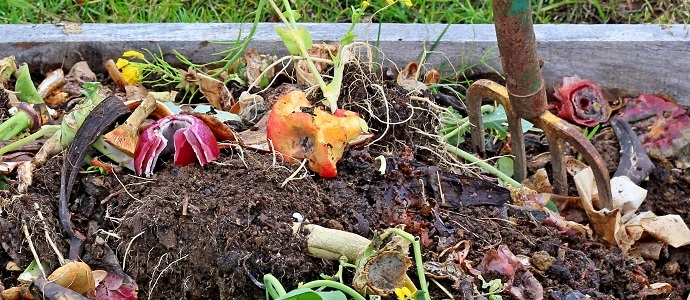Butler and IUPUI’s compost program grant is used up. Photo courtesy of Permaculture Research Institute.
CHRISTOPHER TARVARDIAN | NEWS REPORTER | ctarvard@butler.edu
Butler University composts around 800 pounds of food every week from on-campus dining locations. This process is possible with the help of a grant from the Association for the Advancement of Sustainability in Higher Education. This grant, awarded in 2016, has now almost been completely expended.
Jamie Valentine, assistant director of the Center for Urban Ecology and Sustainability, is responsible for the advancement of sustainability on Butler’s campus.
“The grant provided the funds for Butler to begin composting and start the first composting route in Indianapolis,” Valentine said. “Without collaboration and support from IUPUI and AASHE, the route would not have been piloted.”
Valentine said Butler will need to secure other funding to continue the compost program.
Butler started the composting project in 2015 and joined forces with IUPUI to cut the cost of the transport fee. Ray’s Trash Service transports the compost to a plant each week. This fee is what prevented many institutions from joining the program. Composting is chosen over incinerating the trash because the incineration process releases pollutants into the air. Their plan was to add other institutions into the project and make it more affordable to start composting.
The $50,000 grant was awarded through the Kimberly-Clark Professional Sustainable Campus Competition LIVE!, a national competition in which institutions compete for a sustainability grant. Butler received the grant at the 2016 AASHE conference.
Of the total amount awarded, $10,000 was set aside to help new institutions join Butler and IUPUI’s program, which allowed for sustainable growth in the Indianapolis community. With help from this grant, Marian University and Ivy Tech have been added to the composting program. The four institutions combined produce around 7,000 pounds of compost a week.
At Butler, the Green Council is a relatively new organization that oversees the green fund, a sum that comes out of the student activity fee. Their mission is “to create developmental and educational opportunities for involvement of the student body in sustainability discourse and projects and to inform and support sustainable development as a priority on Butler’s campus.”
However, as of right now, there is no plan to continue the composting using the funding from the green fund said Jarrod Koester, executive chair of the Green Council.
“I would like to see the university take a look into possible options for funding composting for the future,” Koester said.
Koester also said the Green Council will be supporting student led research on composting to help its advancement on campus.



